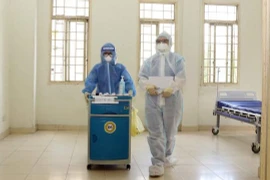 Workers at the Alta Group live temporarily in tents to ensure safety while maintaining production (Photo: tuoitre.vn)
Workers at the Alta Group live temporarily in tents to ensure safety while maintaining production (Photo: tuoitre.vn)HoangMinh Anh Tu, general director of the Alta Group, told TuoiTre (Youth) newspaper that the business rearranged thefactory’s premises in order to set up about 100 tents.
Besidespreparing meals, the company also has separate living quartersfor male and female employees. Male workers sleep in tents, whilefemale workers stay in the office block and sleep in bunk beds.
COVID-19tests are offered regularly to delivery workers and periodically toworkers staying at the company.
Thecompany has also set up a temporary isolation area for F0 (infectedcases) and F1 cases (direct contacts of F0s) before they aretaken to concentrated isolation areas by a medical task force.
Manybusinesses at Saigon Hi-Tech Park have prepared plans to maintainproduction by renting hotel rooms for employees to stay.
Nidec,for instance, encourages its workers, including those from DongNai and Binh Duong provinces where COVID-19 cases have beenreported, to stay at a hotel near the company to avoid interruptionsin production, according to Luu Kim Hong, head of the trade union atNidec Vietnam Co. Ltd.
Thedeputy head of the Saigon Hi-Tech Park management board, Le Thi Bich Loan, saidthat FDI enterprises such as Intel, Schneider, and others have alsorented hotel rooms near the park to provide temporary accommodation for workers.
However,factories in the Hi-Tech Park should first send detailedplans to the board of management for evaluation and appraisal before theyrenting rooms, he said.
Accordingto the HCM City Export Processing and Industrial Zones Authority (HEPZA),nearly 100 enterprises have registered plans to keep production going.
HEPZAsaid that temporary housing was the best choice for small businesseswith only a few hundred workers, but large-scale enterpriseswith up to tens of thousands of people should research betteroptions.
Manybusinesses have had difficulties offering workers temporary housing dueto female workers' personal hygiene needs, a representative of an FDIenterprise in Saigon Hi-Tech Park said.
Moreover,some company premises are not large enough to set up temporaryaccommodations and ensure a safe distance between employees.
TheJuki Vietnam Co., Ltd. in the Tan Thuan Export Processing Zonein District 7 is an example. The company’s director Dao Quoc Cuongsaid: "Based on the company’s current facilities, only 35 percent ofworkers can stay at the company. Living expenses for workers can besolved, but reducing production by 50 to 100 percent will cause the company tosuffer serious losses and lose customers."
Headof the Business Association of Saigon Hi-Tech Park, Ho Uyen, said that inorder to minimise cross-contamination at factories, businessesshould send some workers back to their hometown and increase thefrequency of testing.
Theregulation requiring testing every three days is another difficulty forsmall-scale enterprises.
TranViet Anh, General Director of Nam Thai Son Import-Export Joint StockCompany, said that workers should be tested once a week instead of everythree days because it takes time to get COVID-19 test results, whichincreases the risk of infection.
HCMCity has 1.6 million workers at industrial parks and export processing zones./.





























